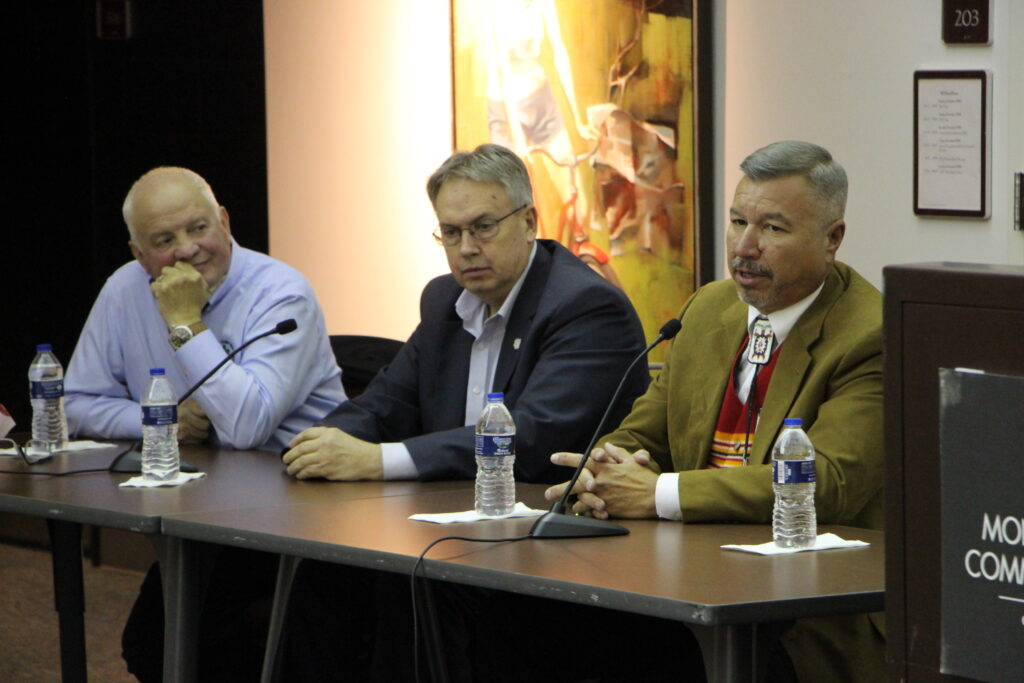
Roughly 30 people attended the Native American Panel Discussion as part of Native American Heritage Month.
In tribute to the month’s dedication, a group of educators and individuals arrived at MCCC to speak about their plans for continuing a journey of understanding and the creation of a new educational program, funded by a Native American Heritage Fund grant.
The panel was held in the La-Z-Boy Center Atrium on Nov. 6. Speakers told their stories about how they became involved in the rediscovery and spreading of Native American history.
The panel featured Scott Bentley, David Hales, Chuck Estep, Kojo Quartey, David Culver, Mayor Robert Clark and Ted Roll, and each brought their own experiences to the table.
Scott Bentley is the superintendent of the River Raisin Battlefield National Park Service. Bentley had realized that the stories told on the battlefield were from an American perspective and found it was vital to give the alternate, native perspective.
Bentley said there are over 80 federally recognized tribes, each with a unique culture and perspective of North American history.
To gather information and understanding on these cultures, a team was formed to travel and understand the oft-forgotten perspective of Native Americans. “What I’ve come to learn is how little I understood U.S. history,” he said.
The panelists discussed the importance of the Native American Heritage grant to teach the untold stories of the history of indigenous people of North America.
The program also works toward identifying and confronting prejudice, racism and hatred by building a sense of understanding and awareness in public spaces and school districts.
David Hales, K-12 social studies consultant at the Wayne Regional Educational Services Agency, identified teachers to become part the program and teach them to teach students how to understand history from many perspectives and be more empathetic.
Chuck Estep is the educational consultant at the Monroe Intermediate School District. His involvement began by providing virtual field trips about the history of Monroe County and Wayne County.
“Being able to provide meaningful opportunities for students that are very tangible to them and real world to them is really what I’m about with regards to teaching history,” Estep said.
Kojo Quartey, president of MCCC, said that with his own travels and involvements it was a natural fit to become part of the journey toward understanding.
The grant has enabled education on native history to reach further beyond Native American Heritage Month.
David Culver, cultural adviser for the Wyandotte Nation in Oklahoma, said Wyandotte history, even general native history, is not taught in Oklahoma.
“To see this great effort to not only educate people in Michigan but for our own people, our Wyandotte people, to be able to touch our history in places where we lived and fought and died and buried is very important for us,” he said.
Culver hopes the journey will continue to help educate the Wyandotte people on their history.
Mayor Robert Clark said you can learn more when you travel, and that knowledge can be used to learn more about your hometown and tell stories correctly and fully.
Grand Chief Ted Roll said his journey began when he visited the first Wyandotte conference in 2010 in Quebec.
“What I learned there was that there was a war in my backyard that I knew nothing about,” he said.
His journey began on the way home when he decided, as chief of his tribal nation, he had to look back at their history and learn what they could.
The journey toward understanding does not come without its obstacles.
Roll said he was looking forward to meeting new people of different tribes and cultures. He said he hopes they will be receptive and openly talk and build relationships.
Estep echoed these concerns with teaching a profoundly hard history that many don’t want to hear and learn.
A challenge may be Michigan being a local control state, meaning that school districts are run by many separate elected school boards.
Estep has had people ask why history should be taught from another perspective if the United States came out on top.
“We still struggle greatly in our country with wanting to hear the whole story from all perspectives,” he said.
Still, he believes it is a history that needs to be told so that future generations can make better decisions.

